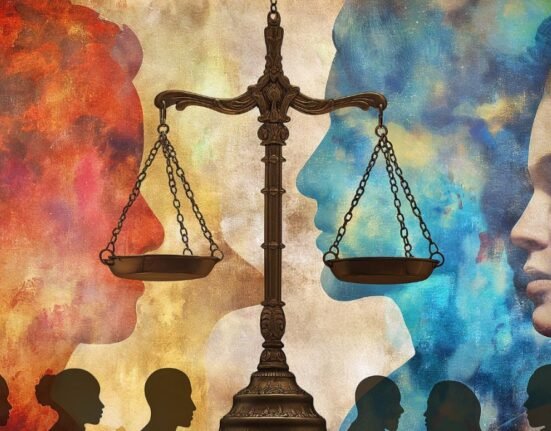This fusion of psychology and law is a significant development that has substantially altered how societies all over the world address issues such as justice, fairness and human behaviour in an interwoven way. By applying the body of relevant knowledge resulting from substantial scientific research in psychology, as well as contributions to this research, legal systems of many countries are making, as yet, inadequate efforts to cure the flaws of equity, accuracy, and mental health that exist in these systems.
The paper considers in complicated ways the use of psychological theories to shape and change the law, from the reinvention of punishment regimes to the expansion of support for crime victims. This article also explains why working together in this way is useful for creating a fairer and more equal society for all.
Getting a Real View of the Complicated Nature of the Law and Human Behaviour
The purpose of laws is to shape people’s choices, and they function well if we know why people sometimes follow them and sometimes refuse to obey. Existing laws about choice are built on the simple idea that choices result from cause-and-effect thinking, but experts in psychology find this is much more complicated. For example, research shows that certainty of being punished works much better as a deterrent than how harsh the penalty is [2][16].
According to several works, many individuals are much more cautious about committing crimes if they think there is a high chance they will be caught. Because of this, policy attention changed strongly to focus not only on policing but also on improving the judicial system, instead of trying to increase penalties.
How the Adolescent Brain Fits into Juvenile Justice
We now know, thanks to neuroscience, that teenagers, especially in the region of the prefrontal cortex that helps with decisions, have brains that are still developing and will not be fully mature until someone reaches their mid-20s. Because of this knowledge, many legislatures have decided to concentrate on helping young offenders improve instead of giving them severe punishments. Several programs are dedicated to education, advice and volunteering, and all are guided by developmental psychology principles, showing great effectiveness in decreasing repeat crimes by young individuals.
Psychology within the Justice System
How much can you rely on the memories of witnesses?
Once, eyewitness statements were trusted the most, but now, thanks to studies on the unreliability of memory, they are being questioned more closely. People often make mistakes when they are under stress, have their memories made hazy by lighting or are led to believe something they haven’t seen. Blind lineup procedures and videoing statements during interviews were made to decrease the risk of mistakes.
Not only has research in the past few years underscored the important ways that socioeconomic circumstances, trauma experience and several dimensions of mental health can shape criminal behaviour in important ways, but psychological studies have also. An example is that strong links are found between poverty and structural inequality and high crime rates, which makes it clear that urgent reforms should deal with the underlying issues rather than just the outcomes.
Looking After and Cutting Down Bias and Discrimination
Many types of bias based on race, gender and wealth have a big impact on almost all decisions by police and the court system. According to scientific research, experts sometimes make connections between certain groups and criminal activity. The findings led to implementing new reforms, such as teaching judges about preventing bias and making efforts to increase jury diversity. By correcting suspect identities at the first hearing, illustrations helped to reduce bias in charging suspects.
How Problems with Mental Health Match with Laws That Address Them
Psychology plays a key part in mental health courts and diversion programs, working to help people with mental health problems avoid imprisonment. Because jail does not provide the type of help needed, these plans instead offer support for mental health issues by treating things like schizophrenia or depression at their source. Consequently, novel ways support a reduction in the number of prisoners and cut the rate of returning prisoners by 30–50% in certain locations.
Showing people how emotions can change during a legal process
Travelling through the legal system tends to cause anxiety, depression and disturbed thinking. To be clear, these court cases can also increase stress for the parties, because seeing the outcomes shows that they hurt people in family cases. To help handle this issue, courts are providing counselling and resources found online. Those accused in UK court cases have their mental state assessed by psychologists, thanks to a new system set up by the Mental Health Tribunal.
Helping the victims and participating in restorative justice
Courts that are aware of trauma realise that a traumatic event can alter someone’s behaviour and/or their memory. Today, a court advocate is assigned to every victim to keep them from being traumatised again during the trial. At first, everything begins by helping all participants share their feelings, which clears up the issue and guides everyone toward recovery. Once treatment is completed, those who were helped usually become happier, and offenders seldom commit more crimes.
Psychology plays a role in both rules and systems governing Legal systems
Because of its focus on decision-making problems, behavioural economics supports creating smaller changes to encourage people to obey the law. Filling out easy-to-use forms at tax time can help more people not miss legal requirements, as does signing up to donate organs as a default in certain places. This field helps to reform our justice system and put healthier outcomes for everyone at the forefront. Another example of this approach is when drug courts treat the offender with rehab, instead of punishing them.
The psychological effect of fighting a legal battle
Legal disputes can cause serious levels of anxiety, depression and thinking issues which come from the continual pressure involved. During family court cases, the emotional stringency of the case often results in more mental health problems for participants than similar conflicts following other laws[8]. Court-ordered counselling and online dispute resolution have now been introduced to lessen the huge number of divorces, and these are designed to help those in great difficulties. A good example of innovation is the UK’s Mental Health Tribunal, which asks psychologists to evaluate people on trial and ensure the proceedings are fair and just.
Reforms and Advances in The Future of Psychology in Legal Reforms
Improvements in neuropsychology and AI are about to change the way legal reforms are carried out. Looking at the brain could support or disprove claims regarding a person’s competence, even though many people worry about mind-reading. Behavioural data fed into predictive algorithms can point out any sentencing bias or help set better rehabilitation paths. At the same time, it is still very important to work against algorithmic discrimination.
Conclusion
Psychology’s impact on law has facilitated reforms that do benefit youths and assist survivors of trauma. But obstacles remain, including bias in AI algorithms and ethical concerns about neurotechnology. Equitable and scientifically defensible justice should be the goal of psychologists, lawmakers and members of the public. As AI advances, weaving in these insights can result in a fairer and dignified society for everyone. While brain imaging is useful, it raises ethical issues, and behavioural × frameworks in machine learning are useful for detecting bias and optimising rehabilitation. It’s crucial that algorithms
Frequently Asked Questions
1. What is the connection between Psychology and Law?
Psychology and law are working more closely these days, with the field of psychology directly influencing laws everywhere. Forensic psychology is a field that analyzes people’s actions and behavior, provides information for the justice system and helps improve outcomes. Psychology explains to legal professionals why some people comply with laws, why testimony might not be accurate and how mental health influences criminal conduct.
2. How can knowledge about people’s behaviour help legal systems?
Exploring how humans behave helps the legal field avoid the limited concept of simple cause-and-effect reasons for decisions. It’s found by researchers that the worry of detection prevents crime better than strong punishments. As a result, policy-makers look more at improving the law and how it is enforced than at making tougher punishments.
3. What role does adolescent brain growth play in juvenile justice?
Experts have found that it is not until the mid-20s that the part of the brain in charge of decisions is fully developed. The new ways of handling young offenders, based on this, have greatly reduced the number of them reoffending.
4. Is it accurate when someone testifies to something they have seen?
Experts used to believe eyewitness testimony, but studies now prove that stress, the way memory changes and bias lead to unreliable testimony. Blind lineups, video-recorded statements and input from specialists are now part of how courts stop wrongful convictions.
5. How do differences in socioeconomic status and mental health affect someone’s behaviour toward crime?
Experts point out there is a strong connection between poverty, experiencing trauma and mental health problems and crime. Looking at the substance of a problem and not just punishing its result is key to successful reform.
6. How much does bias and discrimination influence the way courts make decisions?
Stereotyping based on race, gender and wealth plays a huge role in what happens in police and court cases. Making sure judges learn about bias, increasing diversity on juries and correcting mistakes about the suspect’s identity in the early stages reduces the chances of bias.
7. What do mental health courts and diversion programs do?
Their goal is to steer people with mental health problems away from jail and into the right support system. They have demonstrated that their participants have less risk of committing more crimes and do better in other areas.
References +
Ltd, A. A. (2025, March 19). The relationship between psychology and the law. LawTeacher.net. https://www.lawteacher.net/free-law-essays/criminal-law/the-relationship-between-psychology-and-the-law-2023.php
2) [PDF] Certainty, Severity, and their Relative Deterrent Effects https://repositorium.sdum.uminho.pt/bitstream/1822/2927/1/PSJriskmanuscr iptfinal%5B1%5D.pdf
4) Juvenile & Emerging Adult Justice – Center for Law, Brain & Behavior https://clbb.mgh.harvard.edu/juvenilejustice/
5) What is mental health diversion? – Legal Aid Ontario
https://www.legalaid.on.ca/faq/what-is-mental-health-diversion/
6) Restorative Justice (AQA A Level Psychology): Revision Note https://www.savemyexams.com/a-level/psychology/aqa/17/revision notes/16-forensic-psychology-a-level-only/16-4-dealing-with-offending behaviour/16-4-4-restorative-justice/













Leave feedback about this